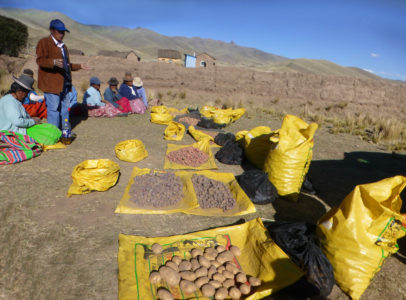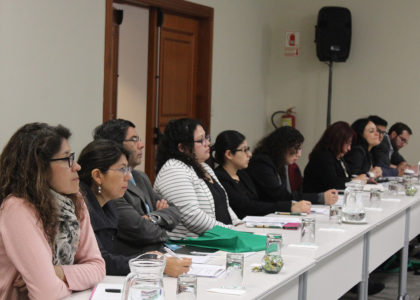
Workshop builds capacities for analyzing postharvest losses
Reducing food loss and waste is essential for ending hunger and malnutrition. According to the International Food Policy Research Institute (IFPRI), about one third of all food produced globally is lost or wasted each year. As part of a wider effort to address this issue, Peru’s Ministry of Agriculture and Irrigation (MINAGRI) and the International Potato Center (CIP) collaborated on the organization of a workshop aimed at building capacity for measuring and analyzing postharvest loss.
The workshop, entitled “Methodologies for the analysis of postharvest losses in agricultural production chains,” brought together 40 specialists from various institutions participating in Peru’s Multi-Sector Commission on Food and Nutritional Security, which is overseen by MINAGRI and involves an array of public institutions and civil society organizations concerned with these issues.
Held in Lima, Peru on November 21, the workshop included presentations by Luciana Delgado, from IFPRI, Gladys Triveño, from the consulting firm Proexpansión, and Cristina Fonseca and Miguel Ordinola, from CIP, among others. Representatives of the Inter-American Institute for Cooperation on Agriculture (IICA) and the Food and Agriculture Organization of the United Nations (FAO) presented case studies of postharvest losses in dried yellow maize and bean production chains respectively, which range between 17% and 26% on average.
“Measuring food losses is key to developing effective policies for dealing with this problem, the reduction of which can contribute to food security in developing countries,” observes Miguel Ordinola, who coordinates CIP’s projects in Latin America and the Caribbean. He notes that studies of potato, bean, corn and cereal value chains have documented postharvest losses ranging between 6% and 25% of total production.

Representatives of CIP and IFPRI presented the methodology they used for a joint study to measure the losses that occur along potato production chains in Peru. That methodology uses a combination of tools that includes surveys, interviews and mapping of value-chain actors, with both quantitative and qualitative evaluations to gather information and capture perceptions. It has also been used in Ecuador, Honduras, Guatemala, Ethiopia and China to analyze value chains of potato and other crops.
The studies of potato, bean, maize and cereal postharvest losses were completed under the CGIAR Research Program on Policies, Institutions and Markets (PIM), which IFPRI leads. PIM is developing a general framework for evaluating the extent and causes of postharvest losses in developing countries though case studies in Latin America, Africa and Asia.
“Building upon this workshop, we will continue working with public and private partners in Peru to apply the methodology to other crops, raise the visibility of this problem, strengthen capacities for measuring losses, and propose solutions based on research,” says Ordinola.
